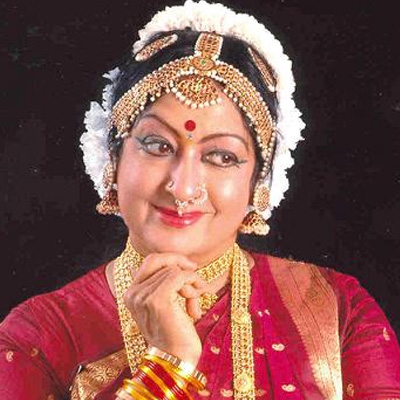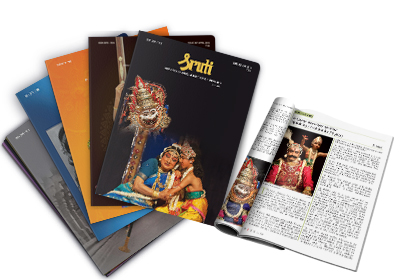
Dr. Padma Subrahmanyam is a rare combination of a dancer, scholar, choreographer, teacher, singer, music composer, author and Indologist. Born on 4 February 1943, to Meenakshi and K. Subrahmanyam, Padma grew up in a household steeped in art and culture. Her father K. Subrahmanyam was a freedom fighter, a pioneer in Indian cinema, and a father figure in the cultural field, while her mother was a music composer, and instrumentalist who played the veena, violin and the harmonium. Padma learnt Bharatanatyam from Vazhuvoor Ramiah Pillai, and music from B.V. Lakshman and Salil Chaudhry. She sang with her sister-in-law Shyamala Balakrishnan in music albums titled Folk Music of Tamil Nadu and Deiva Tamizh Isai. Padma obtained a Bachelor’s Degree in Music, a Master’s Degree in Ethno-musicology, and a Ph.D for her pathbreaking thesis on “Karanas in Indian Dance and Sculpture”. Based on her extensive field work and research, and drawing on her experience as a dancer, Padma reconstructed the 108 karanas through a correlated study of literature, temple sculptures and inscriptions. She revived an obsolete dance technique by translating into practice the theoretical concepts in the Natya Sastra.
Styling her her dance presentations as ‘Bharatanrityam’, Padma also popularised the ‘banika” or mono-acting style in dance by choreographing and presenting full-length dance-dramas like Krishnaya Tubhyam Namaha, Ramaya Tubhyam Namaha, and the Bhagavad Gita, which received popular acclaim. She has choreographed and presented more than 18 solo dance productions and 25 group dance-dramas in different languages. She scores music for most of her dance presentations. Padma has many firsts to her credit. More than three decades ago she mooted the idea of a lecdem series on dance which culminated in her convening the first Natya Kala Conference at Sri Krishna Gana Sabha, Chennai. She has attempted to perform Bharatanrityam to different musical genres. Her experimental choreography include a solo depiction of Jatayu Moksham set to overture of Tchaikovsky’s Romeo and Juliet, and Gajendra Moksham set to the music of Miagi Michio of Japan. At the behest of the Paramacharya of Kanchi, Padma designed a new set of 108 karana sculptures of Siva and Parvati in black granite, for a temple built recently at Satara in Maharashtra. Her dance choreography as President of ABHAI for ‘Rajarajeswaram 1000’ when she led a performance by 1000 dancers on 25 September 2010, to celebrate at the Brihadeeswara Temple in Tanjavur, has entered the Limca Book of Records.
Padma is the President of the dance school Nrithyodaya, established by her father, where she started teaching even as a teenager. Over the years, she has trained many dancers, teachers, vocalists and accompanists for dance. In the past six decades, she has travelled extensively in India and abroad on concert tours, to conduct workshops and participate in seminars sponsored by Governments and private organisations. Padma is a prolific writer of books on sage Bharata, the Natya Sastra, Asian culture, and stories for children. She wrote the script, scored music, choreographed and participated in the teleserial Bharatiya Natya Sastra, produced for Doordarshan by Nrithyodaya and directed by her late brother V. Balakrishnan. Her life and contributions are the subject of books and documentary films in various languages. Several DVDs and audio CDs of her dance productions have been released.
For her achievements and contributions in the field of art and culture Padma Subrahmanyam has been decorated with more than a hundred awards in India and abroad. Some of the prestigious awards are Padma Bhushan, Padma Shri, Sangeet Natak Akademi Ratna (Fellow), the Central Sangeet Natak Akademi Award, Honorary Fellowship of the Asiatic Society, the Fukuoka Asian Cultural Prize, Soviet Land Nehru Award, Kalidas Samman, Natya Kala Acharya, Nadabrahmam, Kalaimamani, Nritya Choodamani, and Viswa Kala Bharati, many honorary doctorates, and several Lifetime Achievement awards.
Padma is associated in various capacities with several universities and cultural organisations in India. She is a Trustee of the Indira Gandhi National Centre for the Arts (IGNCA), New Delhi; a Member of the Expert Committee, Ministry of Culture, Government of India; and Vice-President, Dharma Rakshana Samiti. She is the Managing Trustee of her dream project, the Bharata-Ilango Foundation for Asian Culture in Chennai, which she hopes will serve as a pan-Asian cultural research centre.
s


